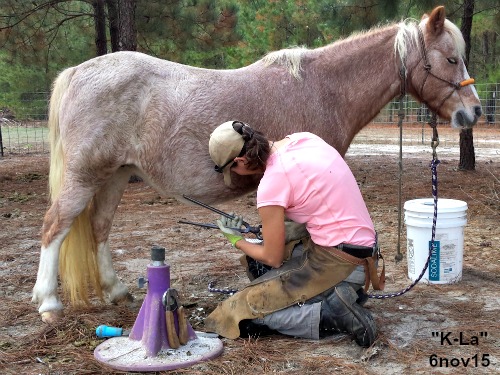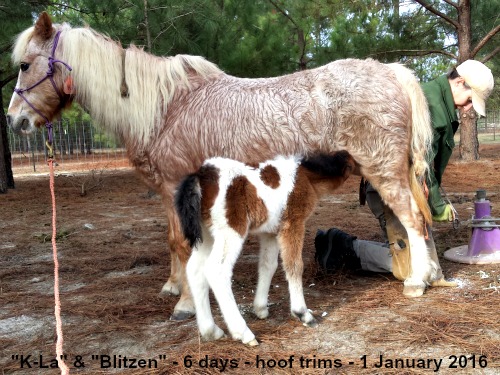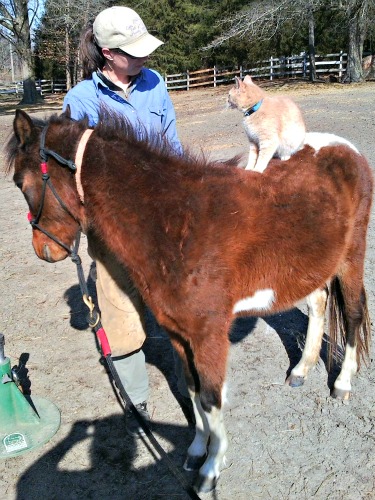The farrier made me afraid again to get horses. He says the minis WILL founder and you have to be so careful.
Yea, I think I'd avoid this one if at all possible. He's not open minded and seems to be set in what he thinks about mini horses and it's not accurate!!
I've now owned Shetlands of different breeding lines, quite a few small enough to qualify as B sized minis, for 21 years in June. Does not include the ponies/minis our family owned when i was growing up before getting back into ponies in 1995. Currently own 26 head and have never had a "true" case of founder or laminitis. EVER. Last fall, DID have a larger mare, older in age (20 yrs) that presented with some founder like issues. She was heavy in foal and maybe a bit overweight. She is more upright & much shorter in her pastern than the majority of our ponies.
She foaled on Dec 26, 2015 and the next time the farrier out in January the "founder symptoms" had magically disappeared - she was rearing, bucking and galloping (hadn't seen her gallop or canter in several months) and her trot - WOW!! Could it have become a problem? Maybe.
My farrier is USUALLY at my "farm" every 2 weeks and we generally eyeball every critter here while she's here... If there is a problem or if she encounters an issue when she's trimming, we schedule that pony sooner to be seen, to be seen by a vet OR to be treated medically w/o the vet w/ her recommended treatment.
Almost all of our ponies show lines in their hooves. You can tell major weather events by how many lines and how far apart they are. WHY? Because a move, a major illness (fever) and get antibiotics, a change in feed or pasture and hurricanes, blizzards, droughts & deep freezes can cause changes in the hoof wall laminae which show up on the outside of the hoof. It doesn't mean they have had founder or are laminitic. It does not mean they are automatically pre-disposed for founder, either.
There were serious changes in the hooves of all 11 ponies that reacted to the Rabies Vaccine in October 2014. YES, those ponies were sore! But they did not become laminitic or get founder nor have there been any real issues since. But you could see the differences in their hooves vs the ponies who didn't get the Rabies vaccine at that time or hadn't gotten it all in 2014. A couple did grow really wonky - not just flares but a compressed heel on one or more hooves, seriously different growth rates in the same hoof etc. The farrier balanced them out as needed. Done and no big deal.
I found a guy who is happy to do their feet, thankfully. Has a lovely Aussie accent
You asked about doing their hooves yourself. There may be a program that is out there in your area. We used to have one - run at a local college by a respected and knowledgeable farrier who went to other courses himself over the years. I never went when I could and I've always regretted it. I have not checked to see if any of our local schools are doing this anymore - mainly because I simply don't have the time right now.
There are books and videos out that show the basics. Trust me, it is not as easy as they make it look! But then I can trim a pony's hoof and have trouble trimming our dogs' nails. I have trimmed in the past, had a farrier for years that worked with me - I did the babies (softer, easier hooves - but not always quiet/easy to do) and worked up to the others. Again, like Chanda, I had a hard time doing the larger horse's hooves - too hard and i never developed the upper body or hand strength to do it. Anyone can (and personally should) learn the basics - at least so that they know if their farrier is doing a decent job and what to ask questions about and how to recognize a problem and be able to call your vet or farrier as needed.
Just as with anything else, there are some conflicting ideas about hoof trimming on angles and other things. You live and you learn - you can't say what will work for one will absolutely work for the next because it may not.
While I know the basics and used to be able to trim hooves easily - things have changed. I have more ponies, more property and no one else around as much. I work a job with a lot more hours on the days that I do work (just cut to 2 days/week this week). I'm older, more out of shape and heavier. It's not as easy now and I chose to spend the $$ on the farrier now who can do 5 ponies in the amount of time it would take me to do 1. That's my choice. In 3 hours, she's here, I've held 5-8 ponies for her to trim, we've walked thru other areas and looked over other ponies and visited. We sometimes argue about a pony's hooves OR I have her go back and look again at what was just done. I try to have a covered area in the event of bad weather, a shaded and fanned area in the heat and fly spray for the ponies made up and ready. I pay more per pony if the weather or anything makes them jumpy, reactive or just unsettled - taking much longer to trim. A couple of times, one or the other of us has lost our temper at one pony pulling lots of idiot stunts and we stop/confront each other before that temper becomes bad. My farrier "tortures" our ponies - by "riding" the babies and "dancing" with some of them... I LOVE MY FARRIER and I can say that our ponies do as well!
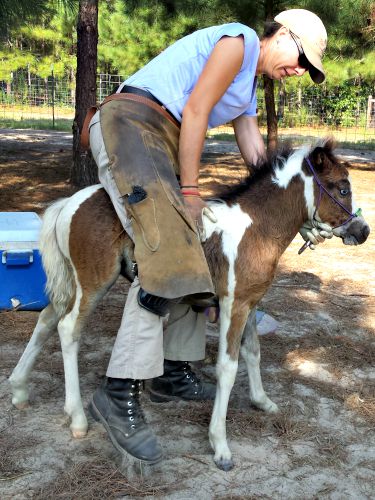
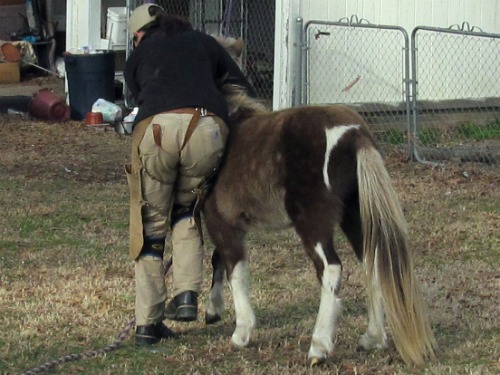
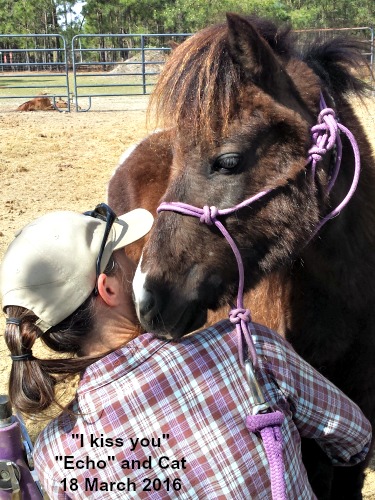
I have had a hard time over the years finding farriers that could or would do small equine. I've had farriers that would strike a horse with the rasp if they pulled a leg away (that farrier escorted off our property by a sheriff - when I called - and previously set appointments cancelled). I have gone a long time when my farrier was ill or injured (can't imagine being out of work due to a serious hand injury - never occurred to me years ago!) or I was ill. I have had a couple of different farriers and still have a backup that I can call (won't for long, he's still active duty Army and he will be leaving for a different state in less than a year,

). In this day and age, with cell phones, I don't find it acceptable for either the owner or the farrier to not connect if there is a problem. One of the farriers I had couldn't understand why i got upset when he didn't show up and didn't call. I understand family ERs,but he seemed to have a lot of them (his wife was a teacher in our daughter's' high school) and he never called. I quite calling him for appointments and his wife asked our daughter why... She was a bit surprised and unhappy with my response. I had to take a partial day off from work when he came out - he only did week days between 9-3 pm. I worked an hourly paid job - i didn't work, I didn't get paid. After 3 times of no show/no call - my boss was questioning me, too, and not as lenient about letting me off for the appointment as I was then usually upset when I arrived at work for partial day.
Learning to do your own horses' hooves isn't a bad thing. Finding a reputable farrier, who can do minis with an open mind and is fair in his/her treatment of both your horse and your time is invaluable. Of course, they want that same respect from you - having the horse trained to stand while having his/her hooves done, holding them w/o distracting them too much (I often groom ponies while my farrier is under them - have to be careful, a wind shift and I could unhappily coat my farrier with what I was grooming off of the horses - BAD), being on time yourself with horses caught and tied up so that the farrier can get to his next client and paying for agreed upon services.
Cat converses with a cat (Mr Blu) before continuing with 2 yr old Comet's hoof trim in March 2013.
 Saves me $60 plus bucks every 6 weeks.
Saves me $60 plus bucks every 6 weeks.




